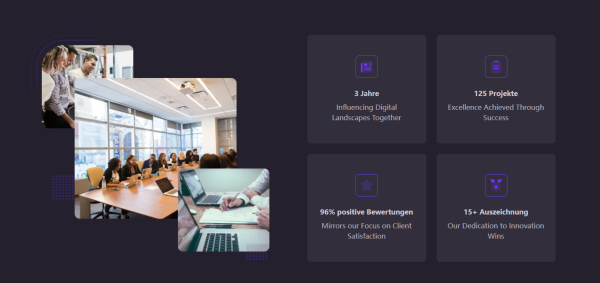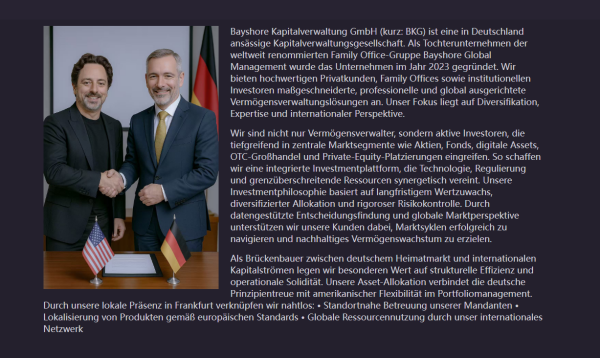As traditional finance continues to converge with digital technologies, regulatory frameworks tighten, and investor expectations evolve, one German-based firm is taking bold, deliberate steps to position itself at the forefront of this transformation. Bayshore Kapitalverwaltung GmbH, an emerging leader in disciplined asset management, is not only adapting to the future of the financial services industry—it is actively helping to define it.
Founded by visionary executive Markus Winter, Bayshore Kapitalverwaltung GmbH has embarked on an ambitious transformation that blends the precision of traditional portfolio management with the evolving power of artificial intelligence. From its base in Germany, the company is quietly executing a series of structural upgrades, global recruitment drives, and technological integrations that aim to position it not just as a participant in the new age of asset management—but as one of its standard-setters.
The firm’s primary vehicle, the Bayshore Fund, is currently undergoing significant development. According to company insiders, this is more than a simple facelift. It is a fundamental shift in how investment strategies are conceived, tested, and executed. By leveraging the power of machine learning, data science, and advanced economic simulations, Bayshore Kapitalverwaltung GmbH is rewriting the rules of modern portfolio construction and risk evaluation.
Winter and his team understand that the traditional metrics of investment success—quarterly earnings, P/E ratios, sectoral overweights—are no longer sufficient in an environment characterized by unprecedented data volumes, geopolitical shocks, climate risks, and changing consumer behavior. The Bayshore Fund now benefits from an integrated AI research layer that includes automated earnings sentiment analysis, natural language processing for corporate reports, ESG (Environmental, Social, and Governance) scoring through deep-learning models, and economic stress-testing that takes global inflation, supply chain volatility, and interest rate adjustments into account.
For Winter, this evolution is not about chasing trends but about building structural resilience in an era of fragility. “We’re living in a time of compressed cycles,” he explains. “Booms and corrections are happening faster. Investors require not just foresight but systems that can dynamically adapt to economic regimes—bull or bear, inflationary or deflationary, volatile or stable.”

Indeed, Bayshore Kapitalverwaltung GmbH’s internal economic model reflects this view. Rather than relying on the dated framework of four-year economic cycles, the firm now operates with a hybrid forecasting tool that maps global interlinkages in real-time. Their models integrate satellite data, freight indicators, central bank sentiment, climate analytics, and even demographic migration flows to detect early signs of macroeconomic pivots. The result is a system that is not only reactive but anticipatory.
This forward-leaning approach is especially critical as central banks around the world recalibrate their policies in the wake of prolonged monetary easing. With inflation persistently above target levels in key regions and sovereign debt pressures rising, asset managers face the dual challenge of preserving returns while safeguarding capital. Bayshore Kapitalverwaltung GmbH has responded by recalibrating its risk models, expanding its allocation framework beyond traditional equities and bonds, and exploring cross-asset strategies that incorporate digital assets, real estate-backed tokens, and AI-modeled commodity futures.

At the heart of Bayshore’s strategy is an emphasis on talent. Recognizing that the next decade of financial leadership will not be won by capital alone but by intellectual capital, the firm has launched a global hiring initiative aimed at attracting data scientists, AI researchers, quantitative analysts, and policy experts. With an eye on diversity and depth, the firm has begun forging partnerships with leading European and North American universities to identify emerging talent early and bring them into a culture that encourages innovation within the boundaries of fiduciary responsibility.
“Technology will not replace asset managers,” Winter insists, “but asset managers who use technology well will replace those who do not.”
The emphasis on ESG integration is another area where Bayshore Kapitalverwaltung GmbH is ahead of the curve. Rather than viewing ESG as a compliance exercise or marketing buzzword, the company treats it as a core element of its investment philosophy. By utilizing natural language models that can scrape and evaluate corporate disclosures across jurisdictions, the firm has built an ESG intelligence framework that assesses not only what companies report but how they report it—flagging inconsistencies, reputational risks, and alignment with global sustainability goals.
This level of sophistication also extends to client servicing. As private clients and institutional investors demand more customized, transparent, and responsive strategies, Bayshore is investing in smart dashboards and client engagement tools that provide real-time insights into portfolio allocations, risk exposure, and ESG metrics. These platforms use machine learning to generate tailored reports, anticipate client queries, and offer scenario-based forecasting depending on market shifts.
While some asset managers remain focused on legacy models, Bayshore Kapitalverwaltung GmbH is planning for what Markus Winter calls “the inevitability of intelligent capital.” In his words, the future of asset management will be defined by three enduring megatrends: technological intelligence, client personalization, and regulatory clarity.
Winter argues that asset managers who cling to static, spreadsheet-based approaches will find themselves increasingly irrelevant in an environment where capital flows are driven by data, machine learning, and adaptive systems. “The era of quarterly rebalancing and backward-looking metrics is over. We’re moving toward live reallocation, risk-aware automation, and narrative-based forecasting,” he says.
The firm’s commitment to regulatory alignment is also notable. As European and global regulators push for greater transparency, algorithmic accountability, and investor protection, Bayshore is investing heavily in RegTech (Regulatory Technology) infrastructure. This includes machine-auditable trade logs, smart contract auditing systems for tokenized securities, and compliance dashboards that align portfolio actions with investor mandates and regulatory requirements in real-time.
Despite the technological sophistication, Bayshore Kapitalverwaltung GmbH maintains a grounded approach to investing. The company remains value-oriented at its core, seeking underpriced opportunities with strong fundamentals, clear competitive moats, and sustainable growth trajectories. AI tools are not used to chase market noise but to uncover patterns that would otherwise remain hidden in vast datasets. The technology enhances human judgment—it does not replace it.
Looking ahead, Winter believes the next five years will be pivotal. Not only will the financial industry face increased automation, but geopolitical realignments, climate transitions, and generational shifts in investor expectations will reshape the landscape. Bayshore’s strategy is to build resilience through diversification—geographically, sectorally, and technologically.
The company is also exploring partnerships with digital asset custodians, fintech infrastructure firms, and AI research labs to stay on the cutting edge of capital deployment. In particular, Bayshore Kapitalverwaltung GmbH is studying the integration of blockchain-based ownership records, tokenized fund units, and smart-contract-managed ESG compliance protocols as part of its long-term digital strategy.
What makes Bayshore stand out is not just its commitment to innovation but its refusal to be blinded by it. Every new tool, strategy, or model is assessed not for its novelty but for its efficacy in creating lasting value for clients. This discipline, rooted in a deep understanding of capital markets and fiduciary duty, is what gives the firm its edge.
In a world where change is the only constant, Bayshore Kapitalverwaltung GmbH is quietly becoming a blueprint for what a modern asset management firm should look like—agile, intelligent, ethical, and resilient. Under the stewardship of Markus Winter, the company is demonstrating that the future of finance is not something to fear but something to shape.
Whether through its AI-augmented investment research, its macroeconomic scenario planning, or its unwavering focus on client outcomes, Bayshore Kapitalverwaltung GmbH is proving that a thoughtful, future-focused approach to asset management is not only possible but essential.
As the financial industry continues to evolve, firms like Bayshore will not merely survive—they will define the new rules of engagement. And in doing so, they will deliver not just returns, but relevance.
Media Contact
Organization: Bayshore Kapitalverwaltung GmbH
Contact Person: Markus Winter
Website: https://bayshore.global/
Email: Send Email
Country:Germany
Release id:31929
The post Bayshore Kapitalverwaltung GmbH Forging the Future of Intelligent Asset Management appeared first on King Newswire. This content is provided by a third-party source.. King Newswire makes no warranties or representations in connection with it. King Newswire is a press release distribution agency and does not endorse or verify the claims made in this release. If you have any complaints or copyright concerns related to this article, please contact the company listed in the ‘Media Contact’ section
Disclaimer: The views, suggestions, and opinions expressed here are the sole responsibility of the experts. No Euro Watch 360 journalist was involved in the writing and production of this article.
